2805NRS Assignment: Legal and Ethical Principles in Healthcare
VerifiedAdded on 2023/04/22
|10
|2831
|241
Essay
AI Summary
This essay examines legal and ethical principles in healthcare, focusing on a case study involving a patient with a traumatic brain injury. The essay explores the ethical principles of beneficence, non-maleficence, justice, and autonomy, highlighting the conflicts that arise when the patient is incapacitated and unable to express their wishes. It delves into legal issues surrounding informed consent, patient rights, and the implications of end-of-life care, particularly in the context of Australian law. The analysis considers the roles of family members, healthcare providers, and legal frameworks in navigating complex medical decisions, including the legality of refusal of treatment and the significance of advance directives. The essay also touches upon vicarious liability and the importance of adhering to ethical guidelines to avoid legal repercussions, concluding with a summary of the interplay between ethical considerations and legal requirements in healthcare practice.
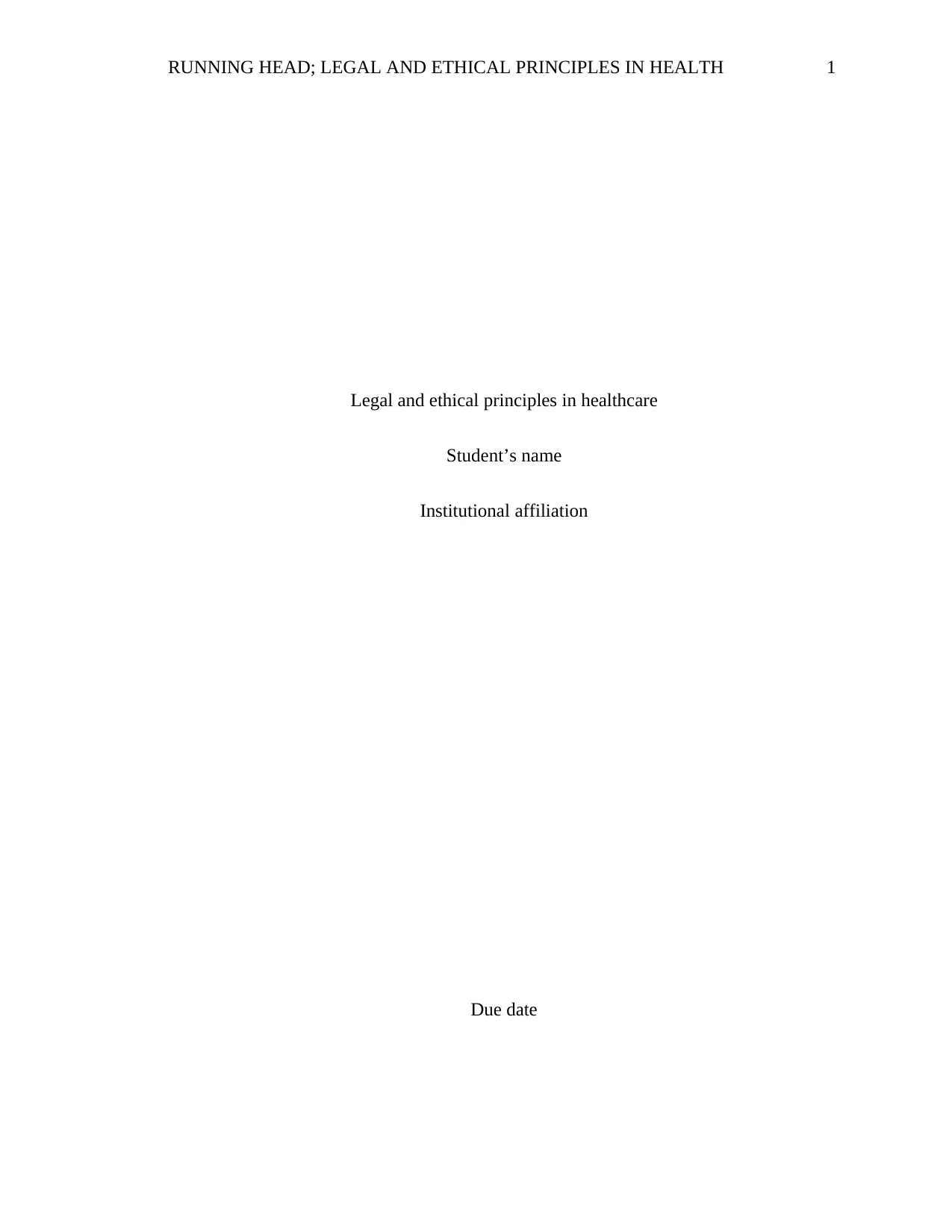
RUNNING HEAD; LEGAL AND ETHICAL PRINCIPLES IN HEALTH 1
Legal and ethical principles in healthcare
Student’s name
Institutional affiliation
Due date
Legal and ethical principles in healthcare
Student’s name
Institutional affiliation
Due date
Paraphrase This Document
Need a fresh take? Get an instant paraphrase of this document with our AI Paraphraser
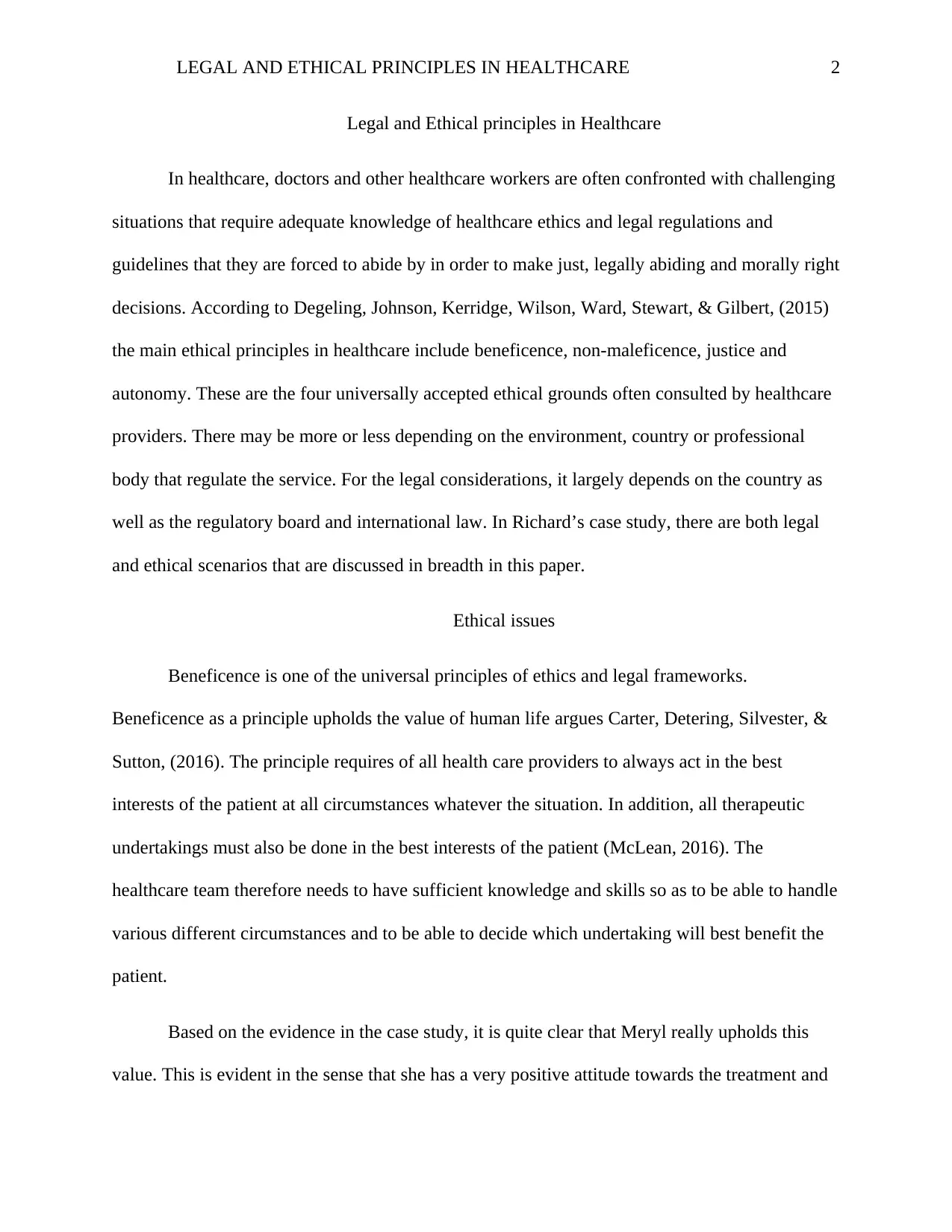
LEGAL AND ETHICAL PRINCIPLES IN HEALTHCARE 2
Legal and Ethical principles in Healthcare
In healthcare, doctors and other healthcare workers are often confronted with challenging
situations that require adequate knowledge of healthcare ethics and legal regulations and
guidelines that they are forced to abide by in order to make just, legally abiding and morally right
decisions. According to Degeling, Johnson, Kerridge, Wilson, Ward, Stewart, & Gilbert, (2015)
the main ethical principles in healthcare include beneficence, non-maleficence, justice and
autonomy. These are the four universally accepted ethical grounds often consulted by healthcare
providers. There may be more or less depending on the environment, country or professional
body that regulate the service. For the legal considerations, it largely depends on the country as
well as the regulatory board and international law. In Richard’s case study, there are both legal
and ethical scenarios that are discussed in breadth in this paper.
Ethical issues
Beneficence is one of the universal principles of ethics and legal frameworks.
Beneficence as a principle upholds the value of human life argues Carter, Detering, Silvester, &
Sutton, (2016). The principle requires of all health care providers to always act in the best
interests of the patient at all circumstances whatever the situation. In addition, all therapeutic
undertakings must also be done in the best interests of the patient (McLean, 2016). The
healthcare team therefore needs to have sufficient knowledge and skills so as to be able to handle
various different circumstances and to be able to decide which undertaking will best benefit the
patient.
Based on the evidence in the case study, it is quite clear that Meryl really upholds this
value. This is evident in the sense that she has a very positive attitude towards the treatment and
Legal and Ethical principles in Healthcare
In healthcare, doctors and other healthcare workers are often confronted with challenging
situations that require adequate knowledge of healthcare ethics and legal regulations and
guidelines that they are forced to abide by in order to make just, legally abiding and morally right
decisions. According to Degeling, Johnson, Kerridge, Wilson, Ward, Stewart, & Gilbert, (2015)
the main ethical principles in healthcare include beneficence, non-maleficence, justice and
autonomy. These are the four universally accepted ethical grounds often consulted by healthcare
providers. There may be more or less depending on the environment, country or professional
body that regulate the service. For the legal considerations, it largely depends on the country as
well as the regulatory board and international law. In Richard’s case study, there are both legal
and ethical scenarios that are discussed in breadth in this paper.
Ethical issues
Beneficence is one of the universal principles of ethics and legal frameworks.
Beneficence as a principle upholds the value of human life argues Carter, Detering, Silvester, &
Sutton, (2016). The principle requires of all health care providers to always act in the best
interests of the patient at all circumstances whatever the situation. In addition, all therapeutic
undertakings must also be done in the best interests of the patient (McLean, 2016). The
healthcare team therefore needs to have sufficient knowledge and skills so as to be able to handle
various different circumstances and to be able to decide which undertaking will best benefit the
patient.
Based on the evidence in the case study, it is quite clear that Meryl really upholds this
value. This is evident in the sense that she has a very positive attitude towards the treatment and
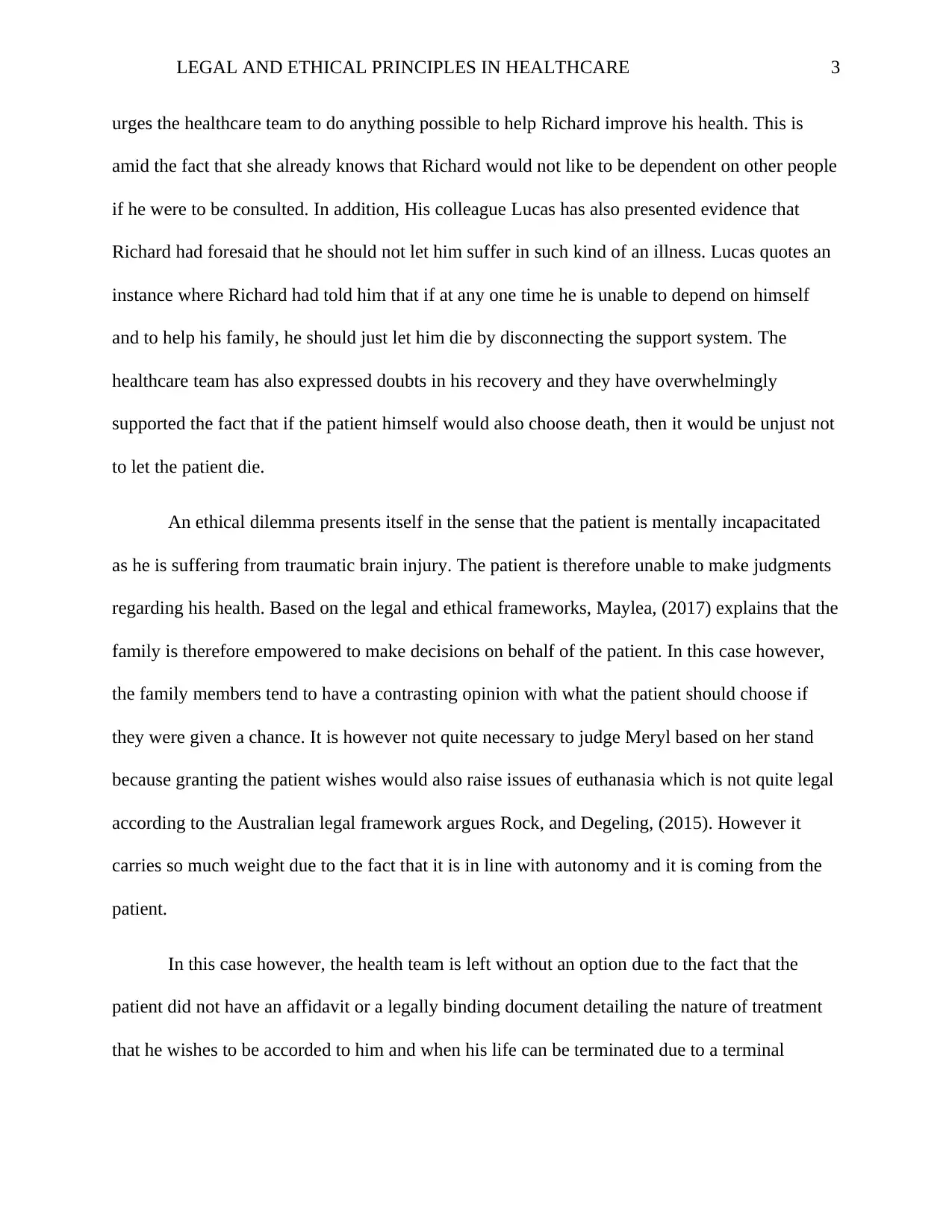
LEGAL AND ETHICAL PRINCIPLES IN HEALTHCARE 3
urges the healthcare team to do anything possible to help Richard improve his health. This is
amid the fact that she already knows that Richard would not like to be dependent on other people
if he were to be consulted. In addition, His colleague Lucas has also presented evidence that
Richard had foresaid that he should not let him suffer in such kind of an illness. Lucas quotes an
instance where Richard had told him that if at any one time he is unable to depend on himself
and to help his family, he should just let him die by disconnecting the support system. The
healthcare team has also expressed doubts in his recovery and they have overwhelmingly
supported the fact that if the patient himself would also choose death, then it would be unjust not
to let the patient die.
An ethical dilemma presents itself in the sense that the patient is mentally incapacitated
as he is suffering from traumatic brain injury. The patient is therefore unable to make judgments
regarding his health. Based on the legal and ethical frameworks, Maylea, (2017) explains that the
family is therefore empowered to make decisions on behalf of the patient. In this case however,
the family members tend to have a contrasting opinion with what the patient should choose if
they were given a chance. It is however not quite necessary to judge Meryl based on her stand
because granting the patient wishes would also raise issues of euthanasia which is not quite legal
according to the Australian legal framework argues Rock, and Degeling, (2015). However it
carries so much weight due to the fact that it is in line with autonomy and it is coming from the
patient.
In this case however, the health team is left without an option due to the fact that the
patient did not have an affidavit or a legally binding document detailing the nature of treatment
that he wishes to be accorded to him and when his life can be terminated due to a terminal
urges the healthcare team to do anything possible to help Richard improve his health. This is
amid the fact that she already knows that Richard would not like to be dependent on other people
if he were to be consulted. In addition, His colleague Lucas has also presented evidence that
Richard had foresaid that he should not let him suffer in such kind of an illness. Lucas quotes an
instance where Richard had told him that if at any one time he is unable to depend on himself
and to help his family, he should just let him die by disconnecting the support system. The
healthcare team has also expressed doubts in his recovery and they have overwhelmingly
supported the fact that if the patient himself would also choose death, then it would be unjust not
to let the patient die.
An ethical dilemma presents itself in the sense that the patient is mentally incapacitated
as he is suffering from traumatic brain injury. The patient is therefore unable to make judgments
regarding his health. Based on the legal and ethical frameworks, Maylea, (2017) explains that the
family is therefore empowered to make decisions on behalf of the patient. In this case however,
the family members tend to have a contrasting opinion with what the patient should choose if
they were given a chance. It is however not quite necessary to judge Meryl based on her stand
because granting the patient wishes would also raise issues of euthanasia which is not quite legal
according to the Australian legal framework argues Rock, and Degeling, (2015). However it
carries so much weight due to the fact that it is in line with autonomy and it is coming from the
patient.
In this case however, the health team is left without an option due to the fact that the
patient did not have an affidavit or a legally binding document detailing the nature of treatment
that he wishes to be accorded to him and when his life can be terminated due to a terminal
⊘ This is a preview!⊘
Do you want full access?
Subscribe today to unlock all pages.

Trusted by 1+ million students worldwide
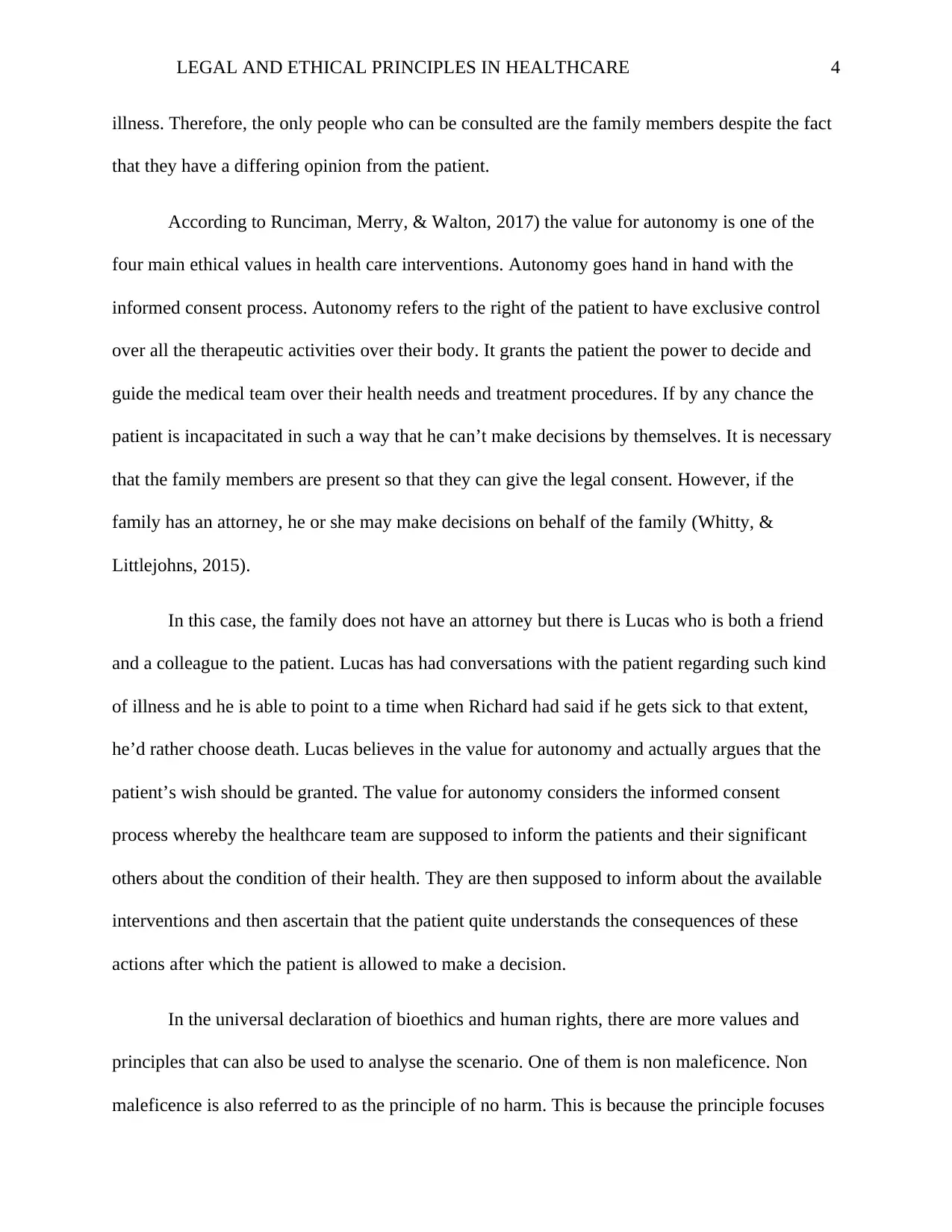
LEGAL AND ETHICAL PRINCIPLES IN HEALTHCARE 4
illness. Therefore, the only people who can be consulted are the family members despite the fact
that they have a differing opinion from the patient.
According to Runciman, Merry, & Walton, 2017) the value for autonomy is one of the
four main ethical values in health care interventions. Autonomy goes hand in hand with the
informed consent process. Autonomy refers to the right of the patient to have exclusive control
over all the therapeutic activities over their body. It grants the patient the power to decide and
guide the medical team over their health needs and treatment procedures. If by any chance the
patient is incapacitated in such a way that he can’t make decisions by themselves. It is necessary
that the family members are present so that they can give the legal consent. However, if the
family has an attorney, he or she may make decisions on behalf of the family (Whitty, &
Littlejohns, 2015).
In this case, the family does not have an attorney but there is Lucas who is both a friend
and a colleague to the patient. Lucas has had conversations with the patient regarding such kind
of illness and he is able to point to a time when Richard had said if he gets sick to that extent,
he’d rather choose death. Lucas believes in the value for autonomy and actually argues that the
patient’s wish should be granted. The value for autonomy considers the informed consent
process whereby the healthcare team are supposed to inform the patients and their significant
others about the condition of their health. They are then supposed to inform about the available
interventions and then ascertain that the patient quite understands the consequences of these
actions after which the patient is allowed to make a decision.
In the universal declaration of bioethics and human rights, there are more values and
principles that can also be used to analyse the scenario. One of them is non maleficence. Non
maleficence is also referred to as the principle of no harm. This is because the principle focuses
illness. Therefore, the only people who can be consulted are the family members despite the fact
that they have a differing opinion from the patient.
According to Runciman, Merry, & Walton, 2017) the value for autonomy is one of the
four main ethical values in health care interventions. Autonomy goes hand in hand with the
informed consent process. Autonomy refers to the right of the patient to have exclusive control
over all the therapeutic activities over their body. It grants the patient the power to decide and
guide the medical team over their health needs and treatment procedures. If by any chance the
patient is incapacitated in such a way that he can’t make decisions by themselves. It is necessary
that the family members are present so that they can give the legal consent. However, if the
family has an attorney, he or she may make decisions on behalf of the family (Whitty, &
Littlejohns, 2015).
In this case, the family does not have an attorney but there is Lucas who is both a friend
and a colleague to the patient. Lucas has had conversations with the patient regarding such kind
of illness and he is able to point to a time when Richard had said if he gets sick to that extent,
he’d rather choose death. Lucas believes in the value for autonomy and actually argues that the
patient’s wish should be granted. The value for autonomy considers the informed consent
process whereby the healthcare team are supposed to inform the patients and their significant
others about the condition of their health. They are then supposed to inform about the available
interventions and then ascertain that the patient quite understands the consequences of these
actions after which the patient is allowed to make a decision.
In the universal declaration of bioethics and human rights, there are more values and
principles that can also be used to analyse the scenario. One of them is non maleficence. Non
maleficence is also referred to as the principle of no harm. This is because the principle focuses
Paraphrase This Document
Need a fresh take? Get an instant paraphrase of this document with our AI Paraphraser
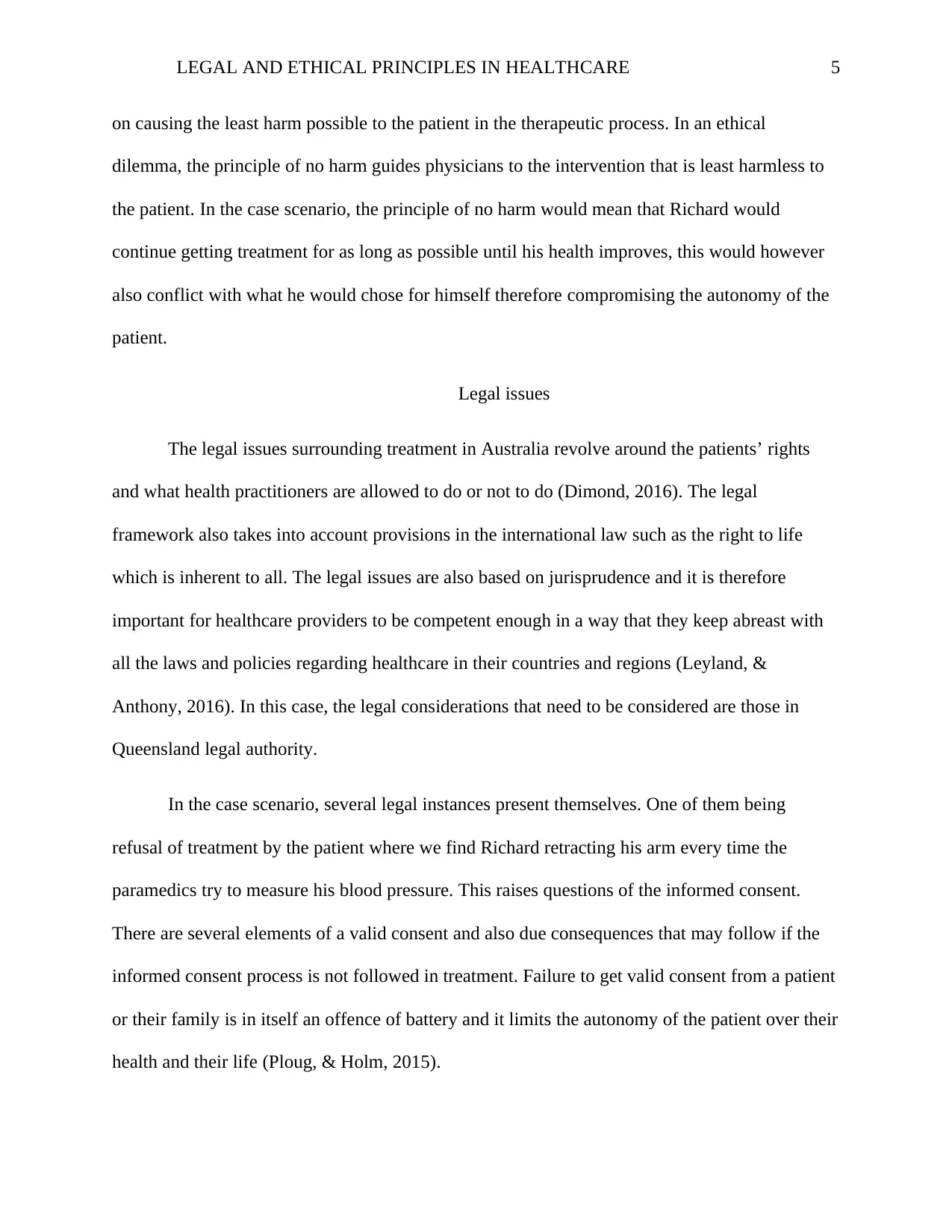
LEGAL AND ETHICAL PRINCIPLES IN HEALTHCARE 5
on causing the least harm possible to the patient in the therapeutic process. In an ethical
dilemma, the principle of no harm guides physicians to the intervention that is least harmless to
the patient. In the case scenario, the principle of no harm would mean that Richard would
continue getting treatment for as long as possible until his health improves, this would however
also conflict with what he would chose for himself therefore compromising the autonomy of the
patient.
Legal issues
The legal issues surrounding treatment in Australia revolve around the patients’ rights
and what health practitioners are allowed to do or not to do (Dimond, 2016). The legal
framework also takes into account provisions in the international law such as the right to life
which is inherent to all. The legal issues are also based on jurisprudence and it is therefore
important for healthcare providers to be competent enough in a way that they keep abreast with
all the laws and policies regarding healthcare in their countries and regions (Leyland, &
Anthony, 2016). In this case, the legal considerations that need to be considered are those in
Queensland legal authority.
In the case scenario, several legal instances present themselves. One of them being
refusal of treatment by the patient where we find Richard retracting his arm every time the
paramedics try to measure his blood pressure. This raises questions of the informed consent.
There are several elements of a valid consent and also due consequences that may follow if the
informed consent process is not followed in treatment. Failure to get valid consent from a patient
or their family is in itself an offence of battery and it limits the autonomy of the patient over their
health and their life (Ploug, & Holm, 2015).
on causing the least harm possible to the patient in the therapeutic process. In an ethical
dilemma, the principle of no harm guides physicians to the intervention that is least harmless to
the patient. In the case scenario, the principle of no harm would mean that Richard would
continue getting treatment for as long as possible until his health improves, this would however
also conflict with what he would chose for himself therefore compromising the autonomy of the
patient.
Legal issues
The legal issues surrounding treatment in Australia revolve around the patients’ rights
and what health practitioners are allowed to do or not to do (Dimond, 2016). The legal
framework also takes into account provisions in the international law such as the right to life
which is inherent to all. The legal issues are also based on jurisprudence and it is therefore
important for healthcare providers to be competent enough in a way that they keep abreast with
all the laws and policies regarding healthcare in their countries and regions (Leyland, &
Anthony, 2016). In this case, the legal considerations that need to be considered are those in
Queensland legal authority.
In the case scenario, several legal instances present themselves. One of them being
refusal of treatment by the patient where we find Richard retracting his arm every time the
paramedics try to measure his blood pressure. This raises questions of the informed consent.
There are several elements of a valid consent and also due consequences that may follow if the
informed consent process is not followed in treatment. Failure to get valid consent from a patient
or their family is in itself an offence of battery and it limits the autonomy of the patient over their
health and their life (Ploug, & Holm, 2015).
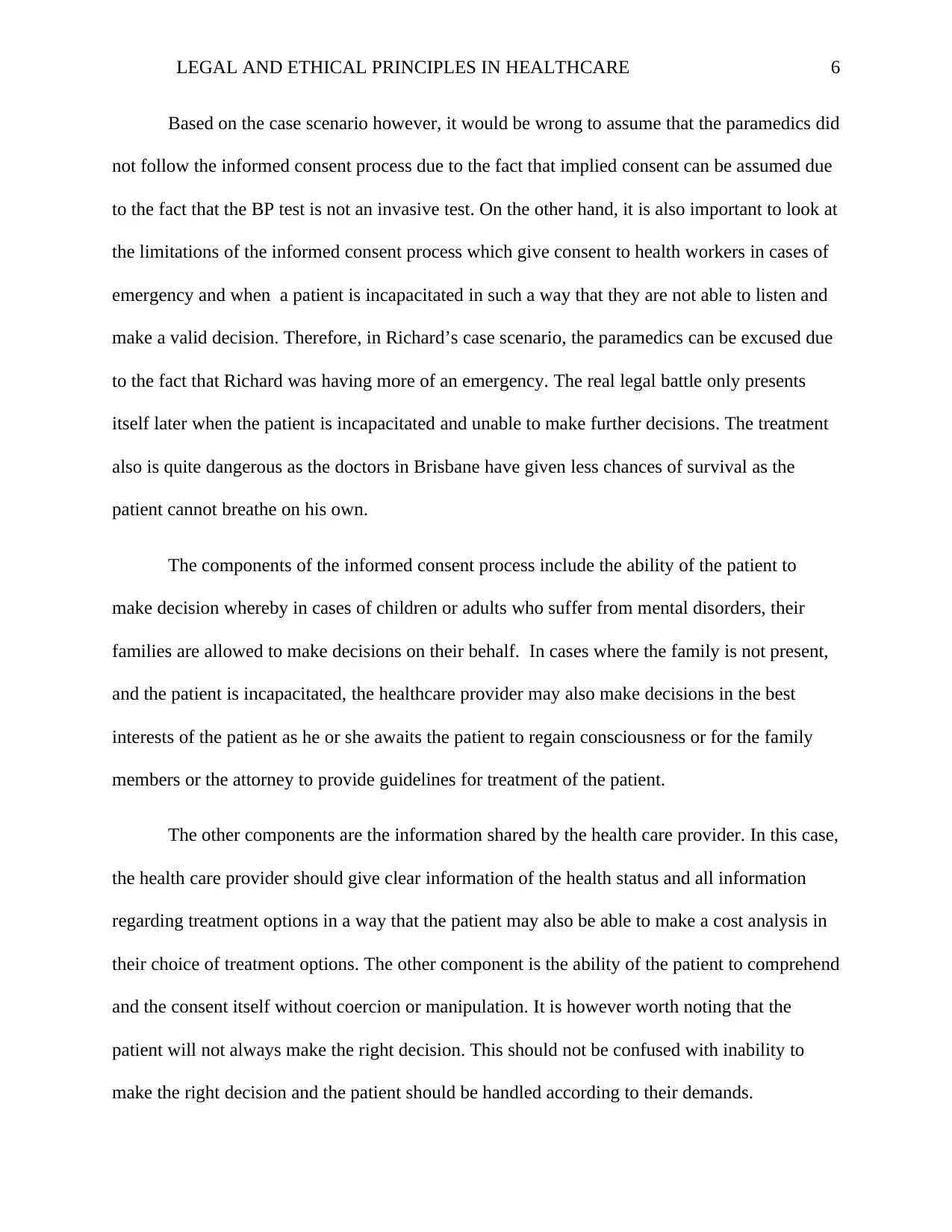
LEGAL AND ETHICAL PRINCIPLES IN HEALTHCARE 6
Based on the case scenario however, it would be wrong to assume that the paramedics did
not follow the informed consent process due to the fact that implied consent can be assumed due
to the fact that the BP test is not an invasive test. On the other hand, it is also important to look at
the limitations of the informed consent process which give consent to health workers in cases of
emergency and when a patient is incapacitated in such a way that they are not able to listen and
make a valid decision. Therefore, in Richard’s case scenario, the paramedics can be excused due
to the fact that Richard was having more of an emergency. The real legal battle only presents
itself later when the patient is incapacitated and unable to make further decisions. The treatment
also is quite dangerous as the doctors in Brisbane have given less chances of survival as the
patient cannot breathe on his own.
The components of the informed consent process include the ability of the patient to
make decision whereby in cases of children or adults who suffer from mental disorders, their
families are allowed to make decisions on their behalf. In cases where the family is not present,
and the patient is incapacitated, the healthcare provider may also make decisions in the best
interests of the patient as he or she awaits the patient to regain consciousness or for the family
members or the attorney to provide guidelines for treatment of the patient.
The other components are the information shared by the health care provider. In this case,
the health care provider should give clear information of the health status and all information
regarding treatment options in a way that the patient may also be able to make a cost analysis in
their choice of treatment options. The other component is the ability of the patient to comprehend
and the consent itself without coercion or manipulation. It is however worth noting that the
patient will not always make the right decision. This should not be confused with inability to
make the right decision and the patient should be handled according to their demands.
Based on the case scenario however, it would be wrong to assume that the paramedics did
not follow the informed consent process due to the fact that implied consent can be assumed due
to the fact that the BP test is not an invasive test. On the other hand, it is also important to look at
the limitations of the informed consent process which give consent to health workers in cases of
emergency and when a patient is incapacitated in such a way that they are not able to listen and
make a valid decision. Therefore, in Richard’s case scenario, the paramedics can be excused due
to the fact that Richard was having more of an emergency. The real legal battle only presents
itself later when the patient is incapacitated and unable to make further decisions. The treatment
also is quite dangerous as the doctors in Brisbane have given less chances of survival as the
patient cannot breathe on his own.
The components of the informed consent process include the ability of the patient to
make decision whereby in cases of children or adults who suffer from mental disorders, their
families are allowed to make decisions on their behalf. In cases where the family is not present,
and the patient is incapacitated, the healthcare provider may also make decisions in the best
interests of the patient as he or she awaits the patient to regain consciousness or for the family
members or the attorney to provide guidelines for treatment of the patient.
The other components are the information shared by the health care provider. In this case,
the health care provider should give clear information of the health status and all information
regarding treatment options in a way that the patient may also be able to make a cost analysis in
their choice of treatment options. The other component is the ability of the patient to comprehend
and the consent itself without coercion or manipulation. It is however worth noting that the
patient will not always make the right decision. This should not be confused with inability to
make the right decision and the patient should be handled according to their demands.
⊘ This is a preview!⊘
Do you want full access?
Subscribe today to unlock all pages.

Trusted by 1+ million students worldwide
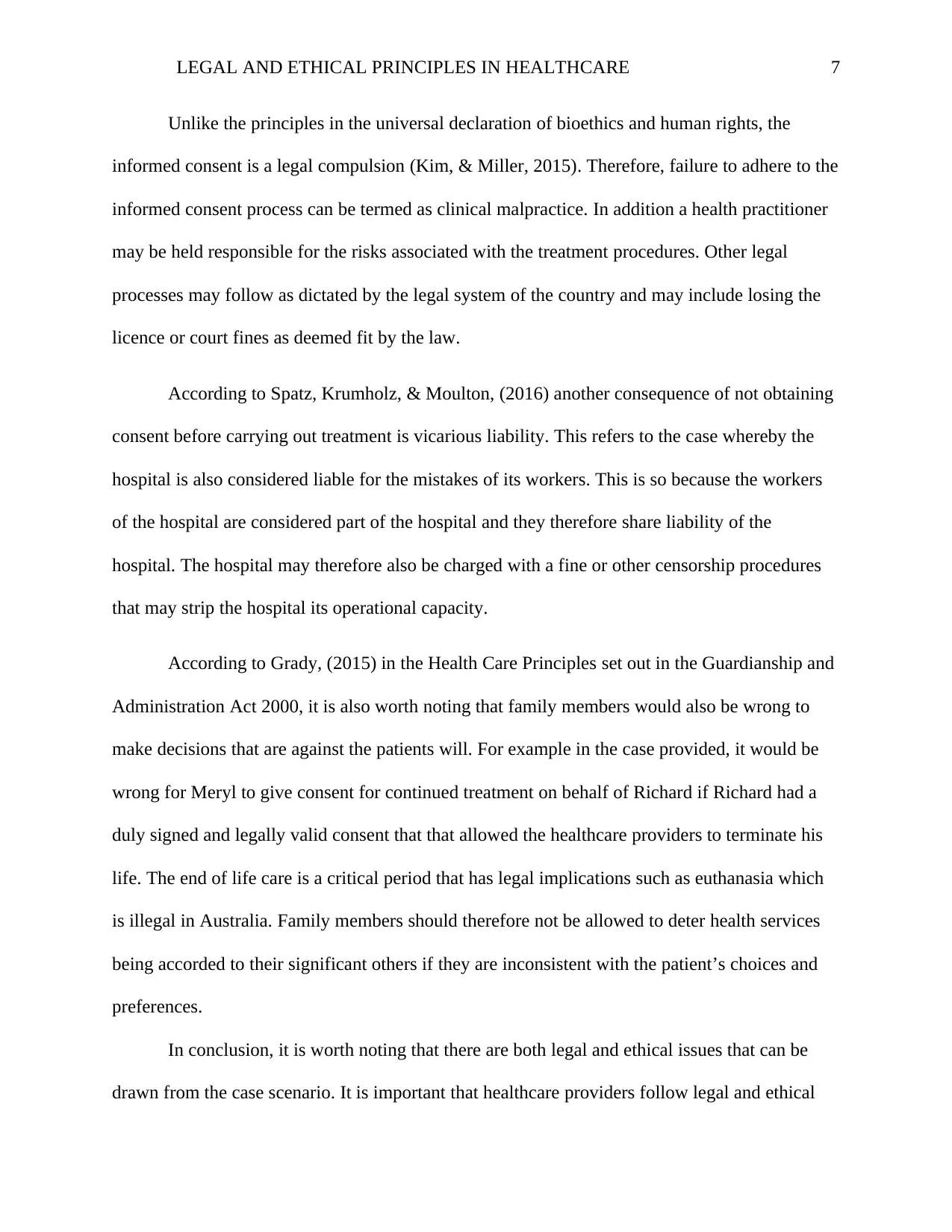
LEGAL AND ETHICAL PRINCIPLES IN HEALTHCARE 7
Unlike the principles in the universal declaration of bioethics and human rights, the
informed consent is a legal compulsion (Kim, & Miller, 2015). Therefore, failure to adhere to the
informed consent process can be termed as clinical malpractice. In addition a health practitioner
may be held responsible for the risks associated with the treatment procedures. Other legal
processes may follow as dictated by the legal system of the country and may include losing the
licence or court fines as deemed fit by the law.
According to Spatz, Krumholz, & Moulton, (2016) another consequence of not obtaining
consent before carrying out treatment is vicarious liability. This refers to the case whereby the
hospital is also considered liable for the mistakes of its workers. This is so because the workers
of the hospital are considered part of the hospital and they therefore share liability of the
hospital. The hospital may therefore also be charged with a fine or other censorship procedures
that may strip the hospital its operational capacity.
According to Grady, (2015) in the Health Care Principles set out in the Guardianship and
Administration Act 2000, it is also worth noting that family members would also be wrong to
make decisions that are against the patients will. For example in the case provided, it would be
wrong for Meryl to give consent for continued treatment on behalf of Richard if Richard had a
duly signed and legally valid consent that that allowed the healthcare providers to terminate his
life. The end of life care is a critical period that has legal implications such as euthanasia which
is illegal in Australia. Family members should therefore not be allowed to deter health services
being accorded to their significant others if they are inconsistent with the patient’s choices and
preferences.
In conclusion, it is worth noting that there are both legal and ethical issues that can be
drawn from the case scenario. It is important that healthcare providers follow legal and ethical
Unlike the principles in the universal declaration of bioethics and human rights, the
informed consent is a legal compulsion (Kim, & Miller, 2015). Therefore, failure to adhere to the
informed consent process can be termed as clinical malpractice. In addition a health practitioner
may be held responsible for the risks associated with the treatment procedures. Other legal
processes may follow as dictated by the legal system of the country and may include losing the
licence or court fines as deemed fit by the law.
According to Spatz, Krumholz, & Moulton, (2016) another consequence of not obtaining
consent before carrying out treatment is vicarious liability. This refers to the case whereby the
hospital is also considered liable for the mistakes of its workers. This is so because the workers
of the hospital are considered part of the hospital and they therefore share liability of the
hospital. The hospital may therefore also be charged with a fine or other censorship procedures
that may strip the hospital its operational capacity.
According to Grady, (2015) in the Health Care Principles set out in the Guardianship and
Administration Act 2000, it is also worth noting that family members would also be wrong to
make decisions that are against the patients will. For example in the case provided, it would be
wrong for Meryl to give consent for continued treatment on behalf of Richard if Richard had a
duly signed and legally valid consent that that allowed the healthcare providers to terminate his
life. The end of life care is a critical period that has legal implications such as euthanasia which
is illegal in Australia. Family members should therefore not be allowed to deter health services
being accorded to their significant others if they are inconsistent with the patient’s choices and
preferences.
In conclusion, it is worth noting that there are both legal and ethical issues that can be
drawn from the case scenario. It is important that healthcare providers follow legal and ethical
Paraphrase This Document
Need a fresh take? Get an instant paraphrase of this document with our AI Paraphraser
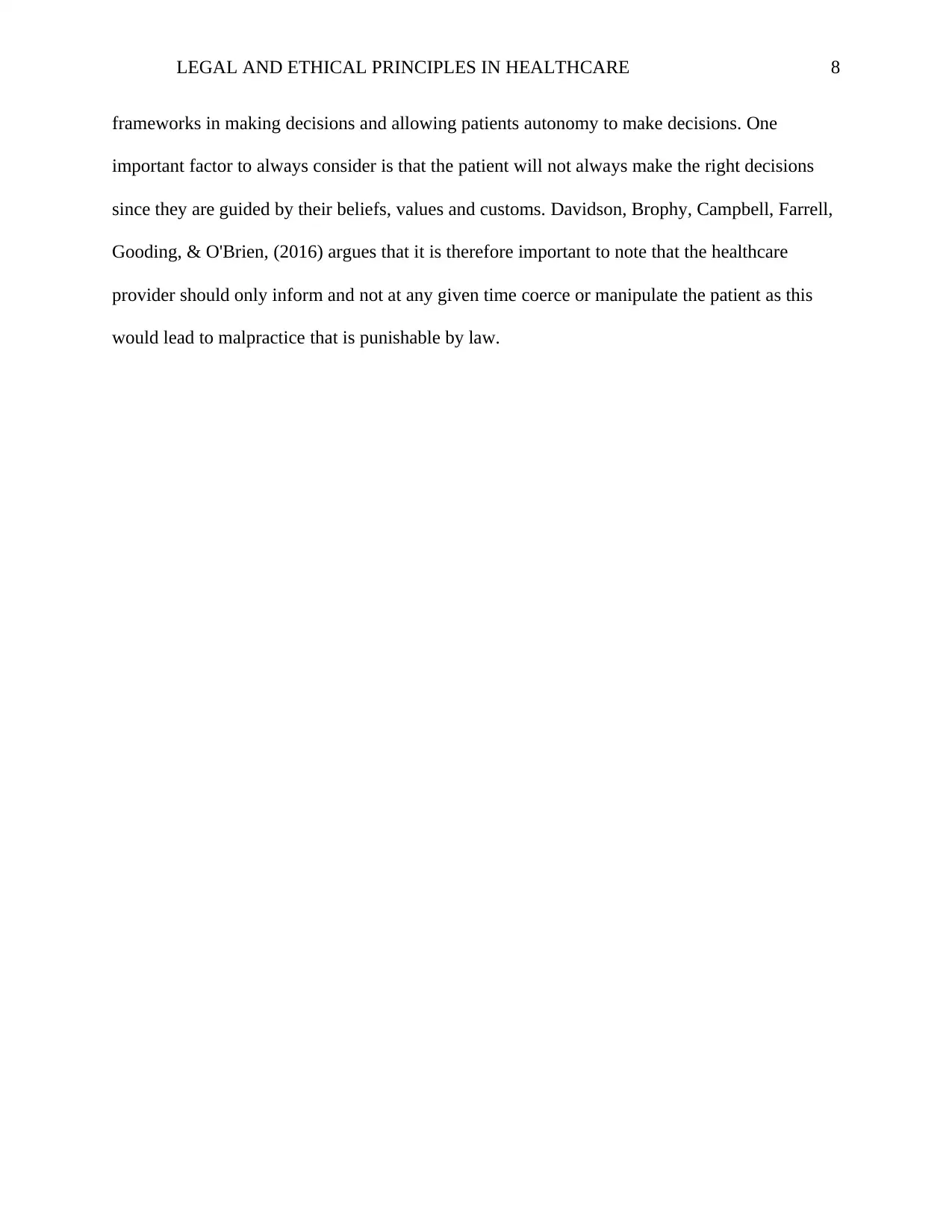
LEGAL AND ETHICAL PRINCIPLES IN HEALTHCARE 8
frameworks in making decisions and allowing patients autonomy to make decisions. One
important factor to always consider is that the patient will not always make the right decisions
since they are guided by their beliefs, values and customs. Davidson, Brophy, Campbell, Farrell,
Gooding, & O'Brien, (2016) argues that it is therefore important to note that the healthcare
provider should only inform and not at any given time coerce or manipulate the patient as this
would lead to malpractice that is punishable by law.
frameworks in making decisions and allowing patients autonomy to make decisions. One
important factor to always consider is that the patient will not always make the right decisions
since they are guided by their beliefs, values and customs. Davidson, Brophy, Campbell, Farrell,
Gooding, & O'Brien, (2016) argues that it is therefore important to note that the healthcare
provider should only inform and not at any given time coerce or manipulate the patient as this
would lead to malpractice that is punishable by law.
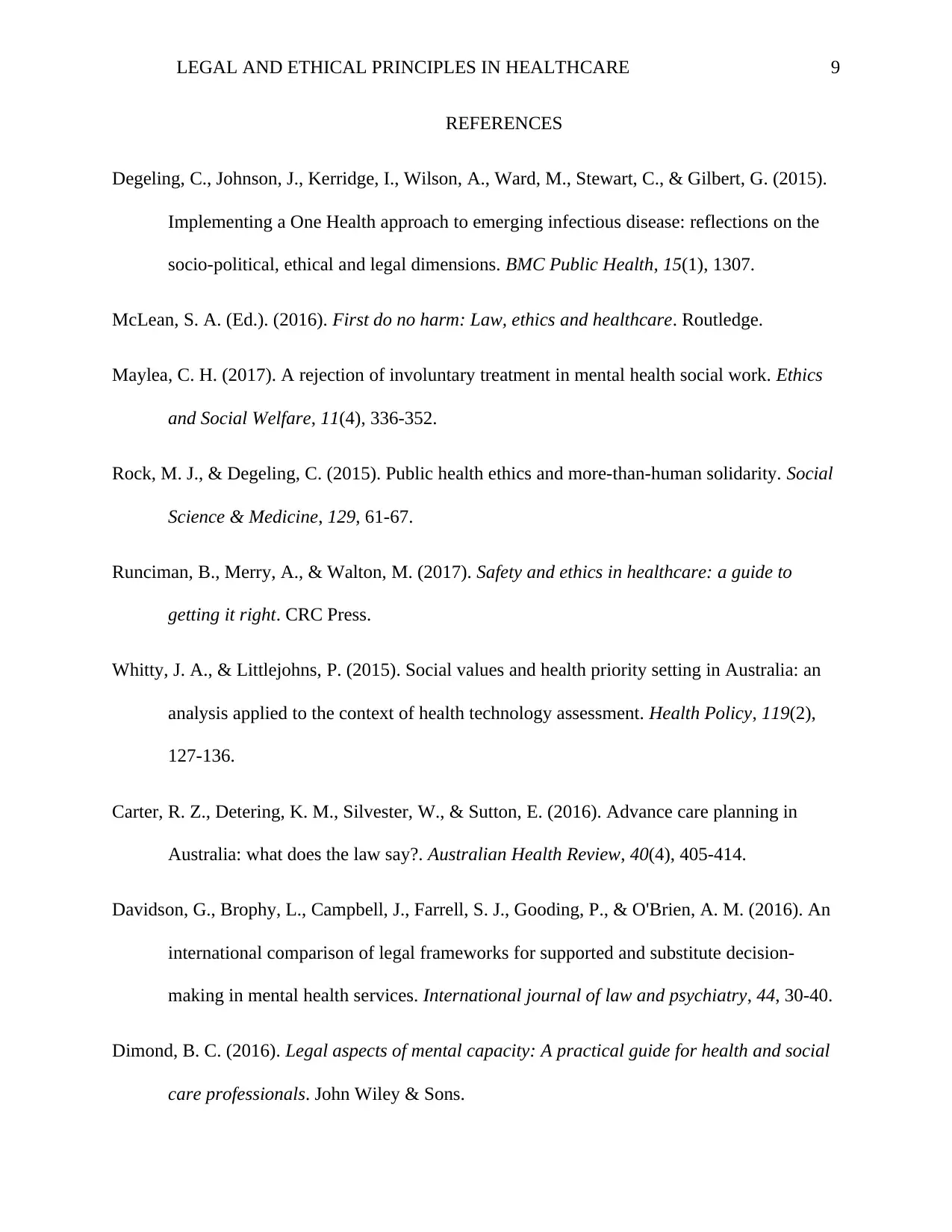
LEGAL AND ETHICAL PRINCIPLES IN HEALTHCARE 9
REFERENCES
Degeling, C., Johnson, J., Kerridge, I., Wilson, A., Ward, M., Stewart, C., & Gilbert, G. (2015).
Implementing a One Health approach to emerging infectious disease: reflections on the
socio-political, ethical and legal dimensions. BMC Public Health, 15(1), 1307.
McLean, S. A. (Ed.). (2016). First do no harm: Law, ethics and healthcare. Routledge.
Maylea, C. H. (2017). A rejection of involuntary treatment in mental health social work. Ethics
and Social Welfare, 11(4), 336-352.
Rock, M. J., & Degeling, C. (2015). Public health ethics and more-than-human solidarity. Social
Science & Medicine, 129, 61-67.
Runciman, B., Merry, A., & Walton, M. (2017). Safety and ethics in healthcare: a guide to
getting it right. CRC Press.
Whitty, J. A., & Littlejohns, P. (2015). Social values and health priority setting in Australia: an
analysis applied to the context of health technology assessment. Health Policy, 119(2),
127-136.
Carter, R. Z., Detering, K. M., Silvester, W., & Sutton, E. (2016). Advance care planning in
Australia: what does the law say?. Australian Health Review, 40(4), 405-414.
Davidson, G., Brophy, L., Campbell, J., Farrell, S. J., Gooding, P., & O'Brien, A. M. (2016). An
international comparison of legal frameworks for supported and substitute decision-
making in mental health services. International journal of law and psychiatry, 44, 30-40.
Dimond, B. C. (2016). Legal aspects of mental capacity: A practical guide for health and social
care professionals. John Wiley & Sons.
REFERENCES
Degeling, C., Johnson, J., Kerridge, I., Wilson, A., Ward, M., Stewart, C., & Gilbert, G. (2015).
Implementing a One Health approach to emerging infectious disease: reflections on the
socio-political, ethical and legal dimensions. BMC Public Health, 15(1), 1307.
McLean, S. A. (Ed.). (2016). First do no harm: Law, ethics and healthcare. Routledge.
Maylea, C. H. (2017). A rejection of involuntary treatment in mental health social work. Ethics
and Social Welfare, 11(4), 336-352.
Rock, M. J., & Degeling, C. (2015). Public health ethics and more-than-human solidarity. Social
Science & Medicine, 129, 61-67.
Runciman, B., Merry, A., & Walton, M. (2017). Safety and ethics in healthcare: a guide to
getting it right. CRC Press.
Whitty, J. A., & Littlejohns, P. (2015). Social values and health priority setting in Australia: an
analysis applied to the context of health technology assessment. Health Policy, 119(2),
127-136.
Carter, R. Z., Detering, K. M., Silvester, W., & Sutton, E. (2016). Advance care planning in
Australia: what does the law say?. Australian Health Review, 40(4), 405-414.
Davidson, G., Brophy, L., Campbell, J., Farrell, S. J., Gooding, P., & O'Brien, A. M. (2016). An
international comparison of legal frameworks for supported and substitute decision-
making in mental health services. International journal of law and psychiatry, 44, 30-40.
Dimond, B. C. (2016). Legal aspects of mental capacity: A practical guide for health and social
care professionals. John Wiley & Sons.
⊘ This is a preview!⊘
Do you want full access?
Subscribe today to unlock all pages.

Trusted by 1+ million students worldwide
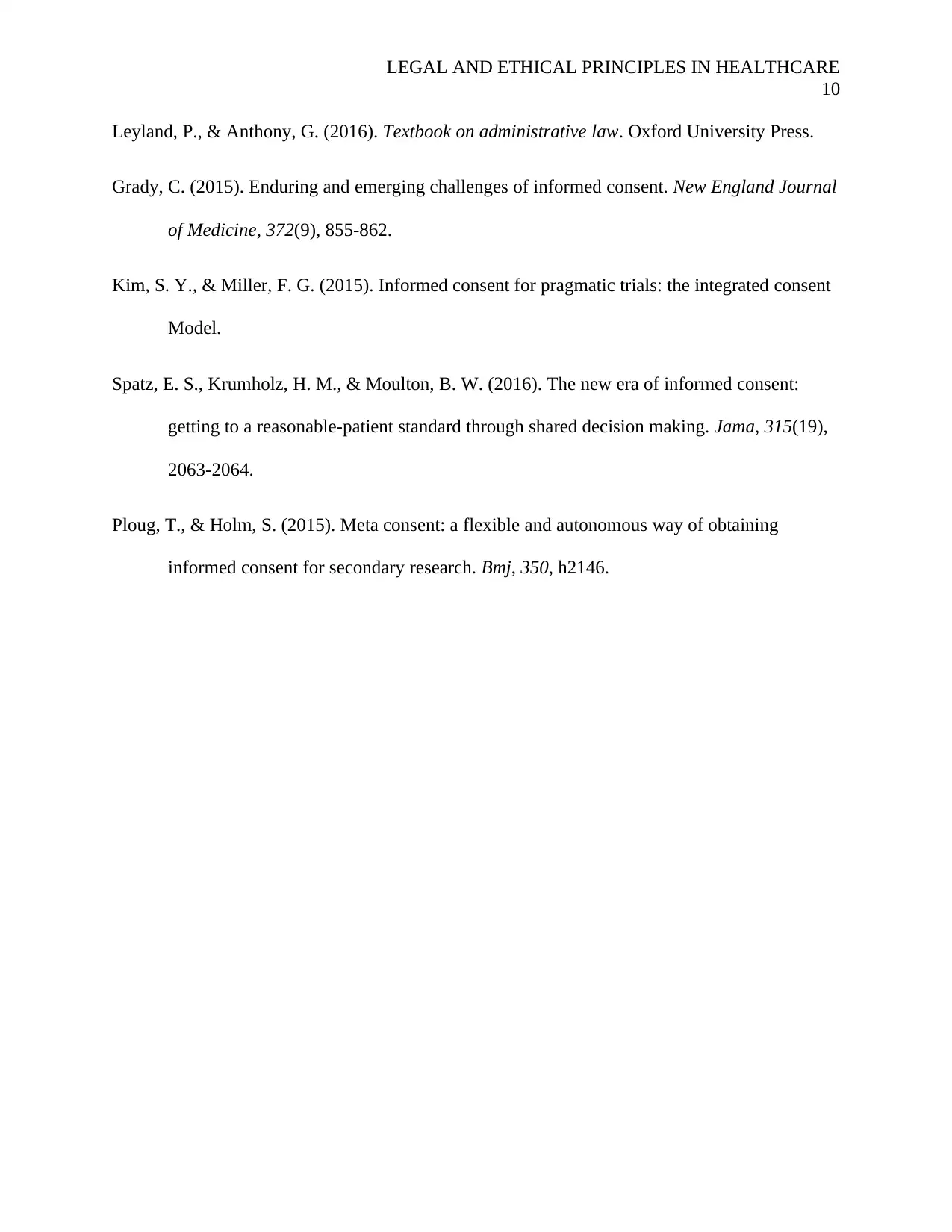
LEGAL AND ETHICAL PRINCIPLES IN HEALTHCARE
10
Leyland, P., & Anthony, G. (2016). Textbook on administrative law. Oxford University Press.
Grady, C. (2015). Enduring and emerging challenges of informed consent. New England Journal
of Medicine, 372(9), 855-862.
Kim, S. Y., & Miller, F. G. (2015). Informed consent for pragmatic trials: the integrated consent
Model.
Spatz, E. S., Krumholz, H. M., & Moulton, B. W. (2016). The new era of informed consent:
getting to a reasonable-patient standard through shared decision making. Jama, 315(19),
2063-2064.
Ploug, T., & Holm, S. (2015). Meta consent: a flexible and autonomous way of obtaining
informed consent for secondary research. Bmj, 350, h2146.
10
Leyland, P., & Anthony, G. (2016). Textbook on administrative law. Oxford University Press.
Grady, C. (2015). Enduring and emerging challenges of informed consent. New England Journal
of Medicine, 372(9), 855-862.
Kim, S. Y., & Miller, F. G. (2015). Informed consent for pragmatic trials: the integrated consent
Model.
Spatz, E. S., Krumholz, H. M., & Moulton, B. W. (2016). The new era of informed consent:
getting to a reasonable-patient standard through shared decision making. Jama, 315(19),
2063-2064.
Ploug, T., & Holm, S. (2015). Meta consent: a flexible and autonomous way of obtaining
informed consent for secondary research. Bmj, 350, h2146.
1 out of 10
Related Documents
Your All-in-One AI-Powered Toolkit for Academic Success.
+13062052269
info@desklib.com
Available 24*7 on WhatsApp / Email
![[object Object]](/_next/static/media/star-bottom.7253800d.svg)
Unlock your academic potential
Copyright © 2020–2026 A2Z Services. All Rights Reserved. Developed and managed by ZUCOL.




